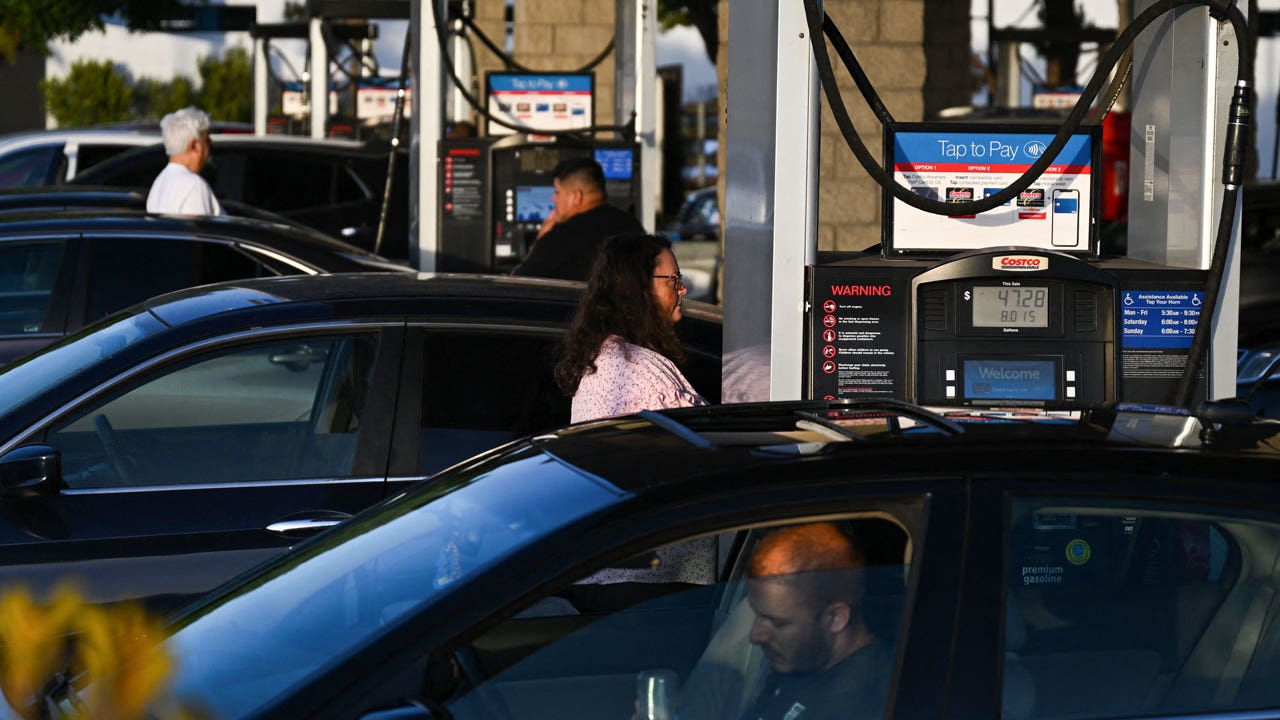As gas prices soar, card networks raise pre-authorization holds on gas purchases

Motorists have been feeling plenty of pain at the pump. As of Aug. 1, the average price for a gallon of gas in the U.S. stood at $4.21 per gallon, according to AAA. As if that wasn’t bad enough, many Americans are finding their cards are denied when they try to pay for their gas.
Just a few months ago, the two largest payment processing networks, Mastercard and Visa, rolled out a 40 percent hike in the maximum amount of a pre-authorization hold for a debit or credit card transaction at a gas pump.
For some card-using motorists, the higher pre-authorization limit might result in overdraft fees or even declined purchases.
This spring, Mastercard and Visa raised the ceiling for a pre-authorization hold for a debit or credit card purchase at a gas pump from $125 to $175. Gas stations and other retailers establish their own hold amounts, but Mastercard and Visa set the upper limit. The two payment networks say they bumped up the maximum hold amount to account for heftier gas purchases triggered by soaring gas prices.
Andy Gerlt, a spokesman for Visa, says the higher maximum amount for pre-authorization holds at gas pumps helps protect gas retailers from fraud.
“This increase in the liability-limit accounts for rising gas prices and encourages fuel merchants to allow larger purchases without any increased risk to them,” Gerlt says.
Financial institutions emphasize that the higher $175 threshold means some cardholders who drive big vehicles don’t need to initiate two transactions to fill up their gas tanks.1
Two other major payment networks, American Express and Discover, don’t set dollar amounts for pre-authorization holds.
What is a pre-authorization hold?
At a gas pump, a pre-authorization hold happens when you use a debit or credit card to pay for a purchase.
Pre-authorization hold for a debit card
When a PIN isn’t entered at a pump for a debit card transaction, a gas station electronically obtains authorization for a purchase. The retailer determines the amount of the hold. Once the transaction is approved, the balance in the account tied to your debit card is decreased, often by an amount higher than the purchase amount.
For instance, you might plan to buy $100 worth of gas, but the amount of the hold is $175. The higher amount ensures there’s enough money to cover the purchase, since the purchase amount isn’t final until your gas tank is filled. Until the hold disappears, you won’t be able to access the difference between the hold amount ($175) and the purchase amount ($100).
The hold on a debit card remains until the retailer receives the money from your financial institution or after a certain period (such as 72 hours), whichever comes first.2 Although some holds might expire within one day, others might take three days or more to be canceled.3
Mastercard and Visa say a debit card hold for a gas purchase is supposed to be lifted within two hours of the fuel being dispensed, but some holds can last longer based on the card payment network used for the gas purchase.
Keep in mind that while Mastercard’s and Visa’s upper limit for a pre-authorization hold at a gas pump is now $175, a gas station might hold as little as $1.
Pre-authorization hold for a credit card
Typically, a pre-authorization hold on a credit card is less of an issue than a pre-authorization hold on a debit card. Why? An authorization of just $1 is usually processed for credit transactions and card transactions requiring a signature.4 In addition, someone’s credit limit might be more generous than their bank balance is.
A pre-authorization hold on a credit card sometimes lasts about five days, but can range anywhere from one to 30 days. In this case, the pre-authorization clock stops ticking when the gas purchase is finished, the amount of the purchase is received by the gas retailer or the window of time for the hold shuts.5
The risk of fees with pre-authorization holds
Consumer advocates complain that the higher limit for pre-authorization holds might cause some consumers to rack up a negative balance on a debit card and possibly be hit with a fee. Or, they add, a higher dollar amount for a hold might chip away at the available credit on someone’s credit card.
Rachel Gittleman, financial services outreach manager at the Consumer Federation of America, says that for debit cardholders with low account balances, pre-authorization holds can be “devastating” when they cause overdraft or non-sufficient funds (NSF) fees. Or a transaction simply might be declined if there’s not enough money to cover a pre-authorization hold.
“It is incredibly difficult for lower-income consumers to avoid overdraft and NSF fees, broadly speaking,” Gittleman says, “but especially those caused by debit holds, as the timing of when credits and debits are posted and settled is incredibly opaque, complicated and out of the consumer’s control.”
Gittleman notes that financial institutions reaped $15.5 billion in revenue from overdraft and NSF fees in 2019.6
For their part, financial institutions insist that a pre-authorization hold is designed to make sure you’re aware that you have enough purchasing power — in this case, to buy gas. This knowledge helps consumers avoid overdraft and NSF fees, they say.7
Legislation pending in Congress would prohibit financial institutions from charging overdraft fees for debit holds that go over the actual transaction amounts. The Consumer Federation of America is among several consumer advocacy groups that have endorsed the legislation.8
Gas retailers fire back
Along with consumer advocates, the biggest trade group for gas retailers is also coming out against the action taken by Mastercard and Visa.
“Holds don’t benefit retailers,” says Jeff Lenard, vice president of strategic initiatives for NACS, a trade organization representing convenience stores. “Customers lose access to their money, and that’s certainly not good for business. However, the customer’s bank can benefit, especially if that triggers a cascade of overdraft fees.”
“Station owners don’t like the holds, but they risk not getting paid for the transaction if they don’t have holds,” Lenard adds. “This would not be a problem if the banks guaranteed payments for transactions.”
Despite the fact that stickers on gas pumps say financial institutions set and release pre-authorization holds, says a spokesman for a banking association, it’s gas retailers that set the hold amounts and have the most say regarding when holds are released.
Lenard points out that banks, not gas retailers, determine the length of a pre-authorization hold, and keep the held money until it’s ready to be freed up.9
As of now, there is no timetable for reducing the maximum dollar amounts of pre-authorization holds.
“One thing to note is that it’s not a requirement that $175 is ever held by a merchant,” says Will O’Connor, a spokesman for Mastercard. “It’s up to the merchant on how they’re managing their operations and their potential risks, just like it’s their decision on a maximum fuel-dispense amount.”
How to avoid trouble with pre-authorization holds
Although pre-authorization holds might seem as inevitable as occasionally running low on gas, you can take these steps to avoid them:
- Enter a PIN when using a debit card, if you have plenty of cash in your account. Most PIN-based transactions are processed immediately.
- Choose “credit” when using your debit card. Credit authorization holds often are only $1.
- Go into the gas station to pay with cash.
- Go into the gas station and ask for pre-authorization of a purchase for a smaller amount of money, such as $30 instead of $50.
- Use a prepaid card, such as a gift card, to pay for gas.
- Search for a gas station with a low dollar amount for pre-authorization holds.
- Make sure there’s enough money in your bank account to cover a gas purchase.
- Set up overdraft protection, so money can be shifted automatically from one account to another at the same financial institution, when a pre-authorization hold causes an overdraft.
Sources
- Visa changes card limits at the gas pump, Olyfed.com, May 2, 2022
- Preauthorization holds FAQs, Washington Trust
- Debit card holds, Consumer Protection Division, State of Georgia
- Debit card holds FAQs, Direct Financial
- What is an authorization hold? Everything you need to know, Payment Cloud
- Large Banks Improve Overdraft Policies and Cut Fees, Pew Trusts, June 21, 2022
- Frequently Asked Questions – Debit Card Holds, Kings Federal Credit Union
- Maloney Joins with Consumer Advocates to Introduce Overdraft Protection Act of 2021, maloney.house.gov, June 30, 2021
- Who’s Responsible for Debit Card Holds? NACS, The Association for Convenience & Fuel Retailing, June 29, 2022






